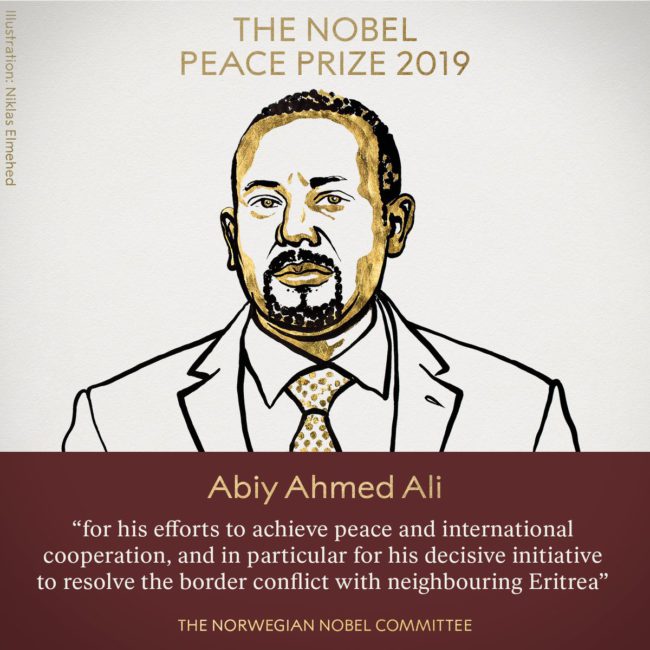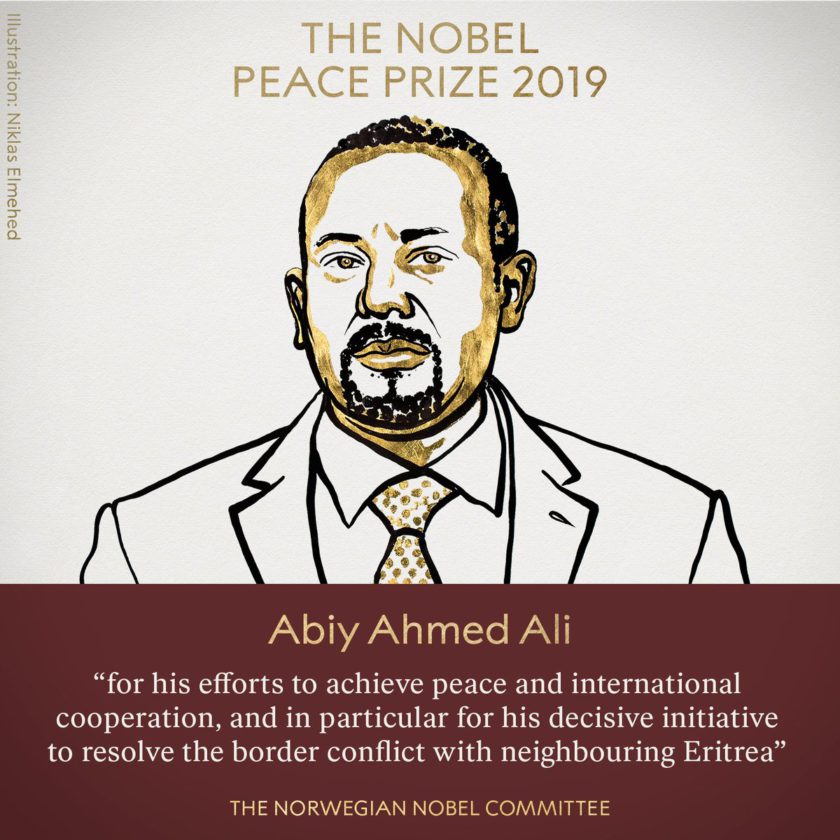If you want to know about this year’s Nobel Peace winner, just jump around my preamble by scrolling down.
I generally applaud the 3 science awards and the literature award, but this one – not so much. Over the years some of the “winners” have been truly bizarre choices. This is perhaps a reflection of it being a political one.
This year they did get it right, but some of the past awards … well … not so much.
Let’s take a brief look and those past failures before we get into the details of who has won this year and why it is well deserved.
What does Peace even mean?
The “Peace” prize was stipulated within Nobel’s will as follows …
“to the person who shall have done the most or the best work for fraternity between nations, for the abolition or reduction of standing armies and for the holding and promotion of peace congresses”
… and goes on to specify that the prize is to be awarded by a committee of five people chosen by the Norwegian Parliament.
Asking politicians to decide is perhaps the fundamental problem.
As stipulated by Nobel in his will, the three science Prizes are decided by the Swedish science academies, and so they involve a great deal of scientific rigour in their selection process. Members of science academies tend to know a bit about science and thus can make good choices. Because “Peace” is chosen by politicians it is deeply subjective and also highly politicised.
But why did Nobel create a Peace prize?
His decision to do so is perhaps partially explained by the observation that Mr Nobel had a life long “friendship” (cough cough) with peace activist Bertha von Suttner, who then later went on to win the peace prize herself in 1905.
So what has been the problem?
Let’s talk specifics about some failed Peace nominations
To illustrate what I’m getting at, let’s look back and see some of the winners from previous years …
- 1973 Henry A. Kissinger and Lê Ðức Thọ for a Vietnam ceasefire :
- When the award was announced, both sides were still carpet bombing each other. At least Lê Ðức Thọ had the decency to decline the award. The fact that Kissinger accepted says a great deal about his personal lack of any integrity. Two Norwegian Nobel Committee members resigned to protest this.
- 1979 Mother Teresa :
- It very much played to the prevailing Mother Teresa PR machinery, but was not actually fact based. She claimed to have the interests of the poor in mind, but actually used all the money she gathered to promote fanatical Catholicism and simply dumped the poor she was supposed to help into some truly appalling conditions. She rather bizarrely announced during her acceptance speech that the number one cause of a lack of peace in the world was “abortion”. Indeed yes, it clearly has been all those abortions in Syria and Iraq that has challenged the region.
- 1989 Dalai Lama :
- Criticism of this might be like trying to shoot Bambi. The issue here is that this is an example of politics in play. It was designed to annoy China and was given to score political points. The choice was fine, the reasoning behind it was seriously screwed up.
- 1992 Rigoberta Menchú:
- She won for “her work for social justice and ethno-cultural reconciliation based on respect for the rights of indigenous peoples“. Unfortunately, her memoirs, which had brought her to fame and this prize, turned out to be partly fictitious.
- 1994 Yasser Arafat, Shimon Peres, and Yitzhak Rabin for making peace between Israel and Palestine :
- Granting them the award at the time was within the remit, and the observation that they actually were striving to build a solution does merit them the award. However, we can look back now and see that it has not exactly gone all that well. Even at the time one of the five Norwegian Nobel Committee members could see how it would play out, so denounced Arafat as a terrorist and not a peacemaker, then quit in disgust.
- 2009 Barack Obama :
- This was another rather blatant political choice. Obama himself was a bit mystified about it. The closing date for nominations was 1st Feb 2009, just 12 days after he took office, so at best can only have been a decision based upon those 12 days.
- 2013 The entire European Union :
- In one respect, I do get this one because the various European states have a long history of going to war with each other, and have ceased doing so since the formation of the EU. I still find giving an award to an entire economic block on the sole basis that they have not ripped out each others throats to be a tad odd. Remember that their stipulated remit for peace is “to the person“, so who exactly is the person here?
What perhaps makes the peace prize even weirder is that Mahatma Gandhi never won. He was nominated in 1937, 1938, 1939, 1947, but never received it. That specific non-award has been publicly regretted. Geir Lundestad, Secretary of Norwegian Nobel Committee, said in 2006 …
“The greatest omission in our 106-year history is undoubtedly that Mahatma Gandhi never received the Nobel Peace prize. Gandhi could do without the Nobel Peace prize, whether Nobel committee can do without Gandhi is the question”
The primary problem here is that (as argued by Norwegian historian Øivind Stenersen) the committee members utilise the granting of the award as a means of furthering Norwegian nation building and also promoting Norway’s foreign policy and economic interests. Since the committee is (as stipulated in Nobel’s will) composed of individuals chosen by the Norwegian Parliament, then this outcome is not exactly a huge shock.
Given the constraints, it is perhaps almost impossible for this to not be a political award.
Having said all that, it is not all bad because sometimes they do get it right by spotlighting somebody truly inspirational. For example Nelson Mandela, or Martin Luther King Jr. (You can find a full list of past winners here). This year is an example of truly picking the right person.
But first, just before we go there, here is one last jaw-dropper.
The 50 Year Rule
Who gets nominated is kept secret for 50 years, and then all is revealed.
So beyond that 50 year blackout resides a rather surprising nomination or two.
(Insert drum role here and prepare to be blown away)
Hitler and Mussolini were both nominated for the Nobel Peace Prize.
You might be tempted to think that this has just got to be parody. Alas no, it appears to be true. (I did also check the Nobel Nomination archives myself just to be sure and verified both)
I suspect the past committee choked on those nominations when they sat down to consider them.
Er … well yes, let’s quick brush over that and move on.
Now for this year’s reveal.
The 2019 Nomination – It’s a good choice

The Norwegian Nobel Committee has decided to award the Nobel Peace Prize for 2019 to Ethiopian Prime Minister Abiy Ahmed Ali for his efforts to achieve peace and international cooperation, and in particular for his decisive initiative to resolve the border conflict with neighbouring Eritrea. The prize is also meant to recognise all the stakeholders working for peace and reconciliation in Ethiopia and in the East and Northeast African regions.
When Abiy Ahmed became Prime Minister in April 2018, he made it clear that he wished to resume peace talks with Eritrea. In close cooperation with Isaias Afwerki, the President of Eritrea, Abiy Ahmed quickly worked out the principles of a peace agreement to end the long “no peace, no war” stalemate between the two countries. These principles are set out in the declarations that Prime Minister Abiy and President Afwerki signed in Asmara and Jeddah last July and September. An important premise for the breakthrough was Abiy Ahmed’s unconditional willingness to accept the arbitration ruling of an international boundary commission in 2002.
Peace does not arise from the actions of one party alone. When Prime Minister Abiy reached out his hand, President Afwerki grasped it, and helped to formalise the peace process between the two countries. The Norwegian Nobel Committee hopes the peace agreement will help to bring about positive change for the entire populations of Ethiopia and Eritrea.
In Ethiopia, even if much work remains, Abiy Ahmed has initiated important reforms that give many citizens hope for a better life and a brighter future. He spent his first 100 days as Prime Minister lifting the country’s state of emergency, granting amnesty to thousands of political prisoners, discontinuing media censorship, legalising outlawed opposition groups, dismissing military and civilian leaders who were suspected of corruption, and significantly increasing the influence of women in Ethiopian political and community life. He has also pledged to strengthen democracy by holding free and fair elections.
In the wake of the peace process with Eritrea, Prime Minister Abiy has engaged in other peace and reconciliation processes in East and Northeast Africa. In September 2018 he and his government contributed actively to the normalisation of diplomatic relations between Eritrea and Djibouti after many years of political hostility. Additionally, Abiy Ahmed has sought to mediate between Kenya and Somalia in their protracted conflict over rights to a disputed marine area. There is now hope for a resolution to this conflict. In Sudan, the military regime and the opposition have returned to the negotiating table. On the 17th of August, they released a joint draft of a new constitution intended to secure a peaceful transition to civil rule in the country. Prime Minister Abiy played a key role in the process that led to the agreement.
Ethiopia is a country of many different languages and peoples. Lately, old ethnic rivalries have flared up. According to international observers, up to three million Ethiopians may be internally displaced. That is in addition to the million or so refugees and asylum seekers from neighbouring countries. As Prime Minister, Abiy Ahmed has sought to promote reconciliation, solidarity and social justice. However, many challenges remain unresolved. Ethnic strife continues to escalate, and we have seen troubling examples of this in recent weeks and months. No doubt some people will think this year’s prize is being awarded too early. The Norwegian Nobel Committee believes it is now that Abiy Ahmed’s efforts deserve recognition and need encouragement.
The Norwegian Nobel Committee hopes that the Nobel Peace Prize will strengthen Prime Minister Abiy in his important work for peace and reconciliation. Ethiopia is Africa’s second most populous country and has East Africa’s largest economy. A peaceful, stable and successful Ethiopia will have many positive side-effects, and will help to strengthen fraternity among nations and peoples in the region. With the provisions of Alfred Nobel’s will firmly in mind, the Norwegian Nobel Committee sees Abiy Ahmed as the person who in the preceding year has done the most to deserve the Nobel Peace Prize for 2019.
